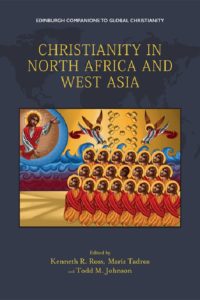In April 2018, Edinburgh University Press published the Edinburgh Companions to Global Christianity’s second volume, edited by Kenneth R. Ross, Mariz Tadros, and Todd M. Johnson. This volume, Christianity in North Africa and West Asia, maps Christianity in the region, provides detailed, country-focused studies from local experts, and presents Christianity’s regional trends. Following the United Nations’ designation for the region, the second volume covers the area stretching from Morocco to Saudi Arabia to Turkey, Armenia, and Azerbaijan. Each country’s profile offers a historical background and explains Christians’ current demographics while also reviewing patterns of growth and movements among Christian communities.
Apart from the country profiles, the volume incorporates essays scrutinizing the major Christian traditions (Anglican, Independent, Orthodox, Protestant, Roman Catholic, Evangelical, Pentecostal, and Charismatic) and key interest areas. The essays engage with the topics of faith and culture, worship and spirituality, theology, social and political engagement, mission and evangelism, gender, interfaith relations, monastic movements and spirituality, ecclesiology, Christian media, and displaced populations. I had the pleasure to cover the topic of religious freedom in the region.
 In my chapter, I scrutinize the level of freedom of religion in North Africa and West Asia, its limitations, and the consequences of those limitations. My analysis focuses on the situation of Christian minorities, explaining the governmental and non-governmental limitations to their religious freedom, including discrimination and persecution. Focusing only on the religious persecution that non-governmental actors perpetrate is insufficient, so the chapter also addresses governments’ restrictions on religious freedom. Change in government behavior would ensure that religious minorities could live out their faith and that religious plurality remained in the region. I also propose some changes that, if introduced, would help ensure that religious freedom is a right for all, in accordance with international law.
In my chapter, I scrutinize the level of freedom of religion in North Africa and West Asia, its limitations, and the consequences of those limitations. My analysis focuses on the situation of Christian minorities, explaining the governmental and non-governmental limitations to their religious freedom, including discrimination and persecution. Focusing only on the religious persecution that non-governmental actors perpetrate is insufficient, so the chapter also addresses governments’ restrictions on religious freedom. Change in government behavior would ensure that religious minorities could live out their faith and that religious plurality remained in the region. I also propose some changes that, if introduced, would help ensure that religious freedom is a right for all, in accordance with international law.
My research’s conclusion indicates that, while religious freedom is protected across the region, government provisions do not currently comply with international obligations. This is especially visible in the case of religious minorities. They experience different degrees of restrictions depending on where they live. The future of religious freedom and religious minorities in the region is contingent upon the protections governments give minorities and the accommodation of an interfaith dialogue aimed at promoting tolerance and guaranteeing religious pluralism. In order to address these challenges, states should recognize and follow international obligations to protect the right to freedom of religion. States should ensure that domestic protections of religious freedom meet international law standards in accordance with Article 18 of the International Covenant on Civil and Political Rights. This would include ensuring that all cases of alleged criminal behavior are investigated and prosecuted while following due process and the rule of law.
Above all, continuing to monitor and assess religious minorities’ situation in North Africa and West Asia is essential. Only by doing so will it be possible to recognize the early stages of practices that threaten the existence of religious minorities and religious pluralism in the region. Such monitoring is especially crucial when states fail to provide sufficient protection. It is also plausible to conclude that governmental institutions will not be able to fulfill this role since state actors reinforce some of the discriminatory practices.
Persecuted minorities themselves should be fully engaged in the process of finding solutions to these problems, if not being the driving force. In contrast, the West should offer support and cooperate closely without imposing solutions.
—
Ewelina U. Ochab is a human rights advocate and author of the book Never Again: Legal Responses to a Broken Promise in the Middle East. She works on the persecution of minorities around the world, with main projects including Daesh genocide in Syria and Iraq, Boko Haram atrocities in West Africa, and the situation of religious minorities in South Asia. She has written over 30 UN topical reports (including Universal Periodic Review reports) and has made oral and written submissions at the Human Rights Council sessions and the UN Forum on Minority Issues. Ochab is currently working on her Ph.D. in international law, human rights, and medical ethics. Follow her work on Twitter: @EwelinaUA.
Photo Credit: Church of St. George in Old Cairo, Egypt, via Pixabay.







 Live in the DC area? Sign-up for Providence's in-person events list!
Live in the DC area? Sign-up for Providence's in-person events list!